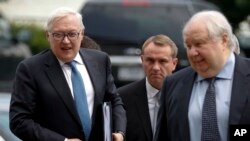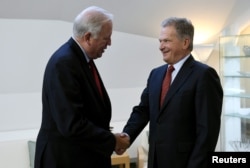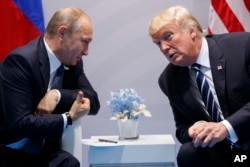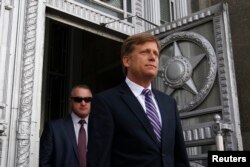Russian Deputy Foreign Minister Sergei Ryabkov has urged the United States to start finding a way to resolve the problems between the two countries.
“We called for a stop to the destruction of Russia-U.S. relations and ... to start finding solutions to resolve problems that are mounting through no fault of ours,” said a Russian Foreign Ministry statement after Ryabkov met with U.S. Undersecretary of State Thomas Shannon in Helsinki, Finland.
Shannon arrived in Finland earlier Monday for the talks aimed at calming tensions, between Washington and Moscow, which have been mounting for months.
Shannon is the State Department's third-ranking official and met earlier this year with Ryabkov to discuss numerous obstacles in the bilateral relationship.
Mounting tensions
Tensions between the Untied States and Russia have been especially high since allegations emerged that Russia interfered in the 2016 U.S. presidential election.
The U.S. Congress passed sanctions against Moscow in July for its alleged meddling and U.S. President Donald Trump, unwilling to risk having lawmakers override a veto, signed the legislation, but blamed Congress for creating new tensions with Moscow.
Trump, who has sought closer relations with Russian President Vladimir Putin, described the legislation as “significantly flawed,” with “clearly unconstitutional provisions” that limited his right to conduct foreign affairs as he sees fit.
Putin retaliated to the new law by closing a U.S. recreational site and a warehouse and ordering the United States to cut 755 diplomats and staff workers, many of them Russians, from its embassy and consulates in Russia.
Trump has been largely dismissive of numerous investigations in Washington into the Russian meddling and accusations that his aides colluded with Moscow, calling them a “witch hunt” and an excuse by Democrats to explain his upset win over his Democratic challenger, former Secretary of State Hillary Clinton. Numerous congressional investigations are under way, as is a criminal probe being conducted by Special Counsel Robert Mueller, a former director of the Federal Bureau of Investigation.
Tragic relationship
Michael McFaul, who served as the U.S. ambassador to Russia from 2012-2014, told VOA's Russian service that the current state of the U.S.-Russia relationship is a “tragedy.”
“It (the US-Russia relationship) is in a bad place. I think you have to go deep into the Cold War to have a comparable time, when things were so confrontational. I personally think it is tragic.”
He laid much of the blame for the poor relationship with Putin.
“I don't think it was inevitable, it didn't have to go this way, but I also think it is largely in response to policies that president Putin did. It takes two to tango to make a good relationship work.”
McFaul cited Putin's efforts to annex Crimea and his support of Syrian President Bashar al-Assad as actions that have put him at odds with the United States and said, “Until he adjusts his policy, we will be in a rather difficult bilateral relationship.”
“Right now, at least in the last couple of years, he (Putin) has done some very dramatic things that have been against the rules of the international system — things like annexation, things like intervention in Syria,” he said.
McFaul described the new Russian ambassador to Washington, Anatoly Antonov, whom he knows personally, as a tough negotiator. McFaul expressed hope that beyond having friendly and warm communication with President Trump, the new Russian ambassador will also reach out to members of the U.S. Congress, the media and the U.S. civil society.
McFaul stressed that despite tensions between the United States and Russia, the two countries need to collaborate on an array of issues, including North Korea's nuclear ambitions.
Yulia Savchenko contributed to this report.








